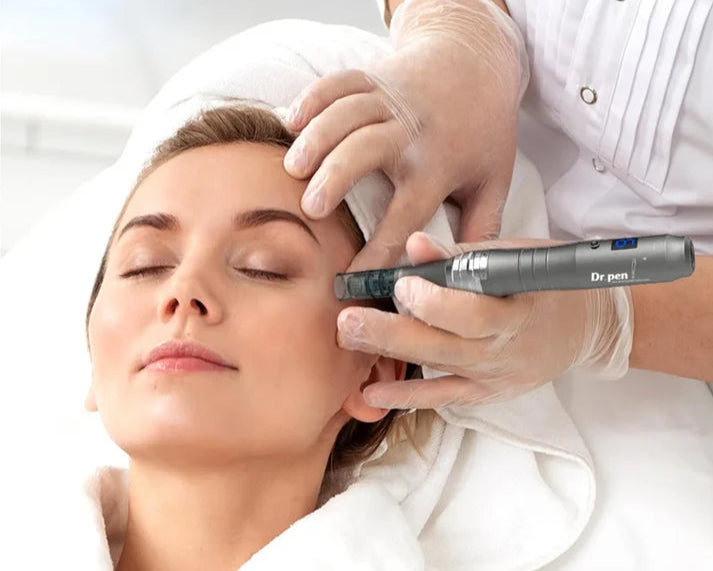Psoriasis is a chronic skin condition that affects millions of people worldwide. It is characterized by the rapid growth and accumulation of skin cells, leading to the formation of thick, scaly plaques on the skin's surface. These plaques can be itchy, painful, and visually distressing, significantly impacting a person's quality of life. While there is no cure for psoriasis, various treatments are available to manage its symptoms and improve the appearance of the skin. One such treatment that has gained popularity in recent years is the use of a microneedling pen.

A microneedling pen, also known as a derma pen or skin needling device, is a handheld tool equipped with tiny, fine needles. When used on the skin, these needles create micro-injuries, stimulating the body's natural healing process. This process, known as collagen induction therapy, encourages the production of collagen and elastin, two essential proteins that contribute to skin health and elasticity. As the skin heals from these micro-injuries, it becomes firmer, smoother, and more even in texture.
But can a microneedling pen help with psoriasis? The answer is not straightforward, as the effectiveness of microneedling for psoriasis varies from person to person. However, there are several reasons why microneedling might be a beneficial addition to a psoriasis management plan.
Firstly, microneedling can help improve skin texture and reduce the appearance of scars. For individuals with psoriasis, this can mean a reduction in the thickness and scaliness of plaques, leading to smoother skin. The micro-injuries created by the microneedling pen prompt the skin to repair itself, which can help diminish the visible signs of psoriasis.
Moreover, microneedling has been shown to enhance the absorption of topical treatments. Many people with psoriasis rely on topical medications, such as corticosteroids or vitamin D analogues, to manage their symptoms. By creating micro-channels in the skin, microneedling can facilitate better penetration of these medications, making them more effective. This can lead to faster improvement in skin condition and a reduction in the amount of medication needed.
Another potential benefit of microneedling for psoriasis is its ability to reduce inflammation. Psoriasis is an inflammatory condition, and reducing inflammation is key to managing its symptoms. Some studies suggest that microneedling can help modulate the immune response in the skin, leading to a decrease in inflammation. By calming the immune system's overreaction, microneedling may help alleviate the redness, itching, and swelling associated with psoriasis plaques.
In addition to its direct effects on the skin, microneedling can also have a positive impact on a person's mental well-being. Living with psoriasis can take a toll on one's self-esteem and mental health. The visible symptoms of psoriasis can lead to feelings of embarrassment, anxiety, and depression. Improving the appearance of the skin through microneedling can help boost confidence and improve overall quality of life. When individuals feel better about their skin, they are more likely to engage in social activities and pursue their daily routines without fear of judgment or discrimination.
Despite its potential benefits, it is important to note that microneedling is not a one-size-fits-all solution for psoriasis. The decision to use a microneedling pen should be made in consultation with a dermatologist or other healthcare professional experienced in treating psoriasis. They can assess the severity of your psoriasis, consider your individual needs and preferences, and determine whether microneedling is a suitable option for you.
There are also some risks and precautions associated with microneedling. The procedure can cause temporary redness, swelling, and discomfort. In rare cases, it may lead to infection, scarring, or changes in skin pigmentation. To minimize these risks, it is crucial to choose a qualified practitioner who follows proper hygiene and safety protocols. The microneedling pen should be sterile, and the procedure should be performed in a clean and controlled environment.
Furthermore, microneedling may not be appropriate for everyone with psoriasis. Individuals with active infections, eczema, or a history of keloid scarring should avoid microneedling. Those with a bleeding disorder or taking blood-thinning medications may also be at increased risk of complications. It is essential to disclose your complete medical history and any medications you are taking to your healthcare provider before undergoing microneedling.
In conclusion, while a microneedling pen may offer some benefits for individuals with psoriasis, it is not a guaranteed cure. Its effectiveness varies from person to person, and it should be used as part of a comprehensive psoriasis management plan. Consultation with a healthcare professional is crucial to determine whether microneedling is a suitable option for you and to ensure the procedure is performed safely and effectively.
When considering microneedling for psoriasis, it is important to approach it with realistic expectations. While it may help improve the appearance of the skin and enhance the absorption of topical treatments, it is unlikely to completely eliminate psoriasis symptoms. However, for some individuals, microneedling may be a valuable addition to their psoriasis management toolkit, offering improvements in skin texture, a reduction in inflammation, and a boost in self-esteem.
As with any the treatment risks, and it consider is individual essential factors to such weigh as the the potential severity benefits of against psoriasis, overall health, and personal preferences. With the guidance of a qualified healthcare professional, microneedling can be a safe and effective option for some individuals with psoriasis, helping them to manage their symptoms and feel more confident in their skin.

Share:
How Long Should a Microneedling Pen Session Last?
How to Adjust the Speed of Your Microneedling Pen